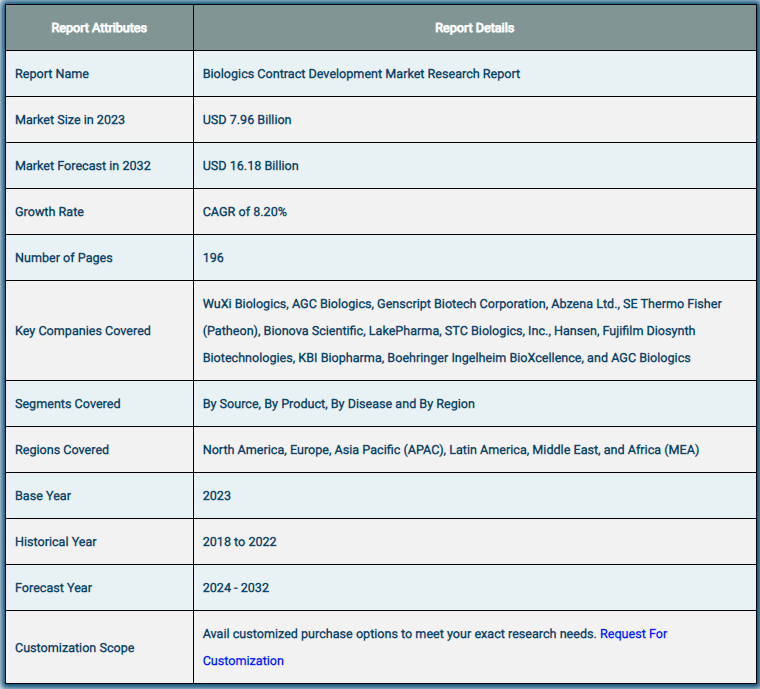Global Biologics Contract Development Market: Trends and Forecast Size, Share, (2024–2032)

The global biologics contract development market was estimated to be worth USD 7.96 billion in 2023 and is expected to grow to USD 16.18 billion by the end of 2032, per a report released by Zion Market Research. Over the course of the projected period, the market is anticipated to expand at a CAGR of 8.20%. The growth factors, barriers, and effects on demand of the worldwide biologics contract development market are examined in this study for the period of forecasting. Additionally, it will assist in navigating and investigating the emerging opportunities in the field of biologics contract development.
✈👉Get a Free Sample: 🚀https://www.zionmarketresearch.com/sample/biologics-contract-development-market
Abstract:
The biologics contract development market, driven by the increasing demand for biopharmaceuticals, is evolving rapidly. With the rise of biologics as a dominant class of therapeutics for chronic diseases, the need for contract development and manufacturing organizations (CDMOs) is expanding. This article examines the current market landscape, technological advancements, and key players. It also highlights the factors influencing market growth, the challenges facing the industry, and future opportunities.
Introduction: The Role of Biologics in Modern Medicine
Biologics, including monoclonal antibodies, recombinant proteins, and cell and gene therapies, have revolutionized the treatment landscape for chronic diseases such as cancer, autoimmune disorders, and genetic conditions. However, the complexity and cost of developing biologics have led many pharmaceutical companies to outsource certain processes to specialized contract development and manufacturing organizations (CDMOs). This market has seen significant growth in recent years, driven by the rising demand for innovative biologic therapies.

Overview of the Global Biologics Contract Development Market
The full-service outsourcing business known as biologics contract development produces biotechnology, pharmaceutical, and medical device-supporting biomaterials under a third-party’s name.
The biologics contract development market is a critical component of the broader biopharmaceutical industry. CDMOs offer services that range from early-stage development to large-scale commercial production. The market is segmented by service type, including:
- Process Development
- Cell Line Development
- Upstream and Downstream Processing
- Analytical and Formulation Development
- Regulatory Support
With biologics accounting for a growing share of new drug approvals, the market for biologics CDMOs is experiencing a surge in demand, particularly for specialized services in advanced therapy medicinal products (ATMPs), such as gene and cell therapies.
Growth Factors for the Global Biologics Contract Development Market
The rise in the use of cutting-edge methods for biological manufacturing, pharmaceutical companies outsourcing their R&D, and an atmosphere that is conducive to conducting clinical trials are some of the key reasons driving the global biologics contract development market.
Pharma and biopharma firms are increasingly outsourcing in order to grow in both developed and emerging nations as a result of the rise in merger and partnership activity.
For example, to strengthen its gene therapy portfolio, Thermo Fisher Scientific Inc. purchased Brammer Bio, a pioneer in contract development of cell and gene therapy.
In recent years, there has been an increase in conditions like cancer, neurological illnesses, cardiovascular disorders, gynaecological disorders, and ocular disorders.
Numerous pharmaceutical leaders are contributing to the development of innovative treatments for the effective management of chronic illnesses, and the healthcare CDMOS has emerged as a saviour in patient care.
Increased investment in R&D for upcoming technological developments drives the market’s rapid and substantial growth.
Single-use bioreactors gradually replace biological contracts in order to improve manufacturing flexibility and lower upfront expenses.
Increased manufacturing productivity flexibility boosts biology supply, which propels the worldwide biologics contract development market.

Market Segmentation for Global Biologics Contract Development
Source, product, disease, and geography are the four categories into which the worldwide biologics contract development market may be divided.
The market can be divided into microbial, mammalian, and other segments based on the source.
With the biggest market share, the mammalian sector is expected to develop significantly over the next several years.
The use of mammalian cells for protein synthesis to create precise post-transnational mammalian protein is responsible for the growth.
For the generation of CMO cells and protein therapies, Chinese mammalian cells are the most favoured. Over the projection years, the microbial cell segment is anticipated to increase at a rapid pace. The main applications of microbial cell lines are in the synthesis of cytokines, enzymes, hormones, and other substances.
The market can be divided into two segments based on product: process development and cell line development.
The greatest market share in the worldwide biologics contract development market is held by the process development category.
Upstream, downstream, and other categories can be used to further divide the process development.Selecting the appropriate cell line, bioreactor system, operating dimensions, and culture medium are all part of the upstream process.
Testing and purification of a fermented medium containing an inoculum are part of the downstream procedure.
The downstream process sector includes a wide range of qualitative evaluations, such as packaging, verifying polishing, physicochemical characterisation, and medicinal analysis.
The market can be divided by disease, including haematological disorders, cardiovascular disorders, immunological disorders, and cancer.The biggest market share is held by the oncology division.Throughout the forecast years, the immunology segment is anticipated to increase at a rapid pace. Globally, the number of immune system dysfunction instances is rising.
✈👉Directly Purchase a copy of the report with TOC: 🚀https://www.zionmarketresearch.com/toc/biologics-contract-development-market
Market for Contract Development for Biologics: Report Scope

Regional study of the global biologics contract development market
The global biologics contract development market is dominated by North America. The increase in R&D spending and the local presence of multinational corporations are responsible for the region’s growth. Increased outsourcing of clinical trials and other jobs is another factor contributing to the rise of contract development (CDO), which in turn stimulates the regional market.Throughout the projection years, Asia Pacific is anticipated to grow at a rapid pace. The expansion can be ascribed to the modifications made to alter the clinical trial evaluation criteria and the heightened expenditure made by major industry participants to advance technology.
Key Market Drivers
Several factors are driving the growth of the biologics contract development market, including:
- Increasing Demand for Biopharmaceuticals: As biologics become the go-to treatment for many chronic diseases, pharmaceutical companies are seeking external expertise to scale up production.
- Rising Complexity of Biologics: The intricate nature of biologic drugs, including their structure and production, requires specialized knowledge and equipment, which CDMOs can provide.
- Cost Efficiency and Flexibility: Outsourcing to CDMOs reduces the need for companies to invest heavily in internal infrastructure, providing flexibility and reducing time to market.
- Advances in Biomanufacturing Technologies: Innovations in cell line engineering, bioprocessing technologies, and automation are enabling more efficient biologics production, enhancing the role of CDMOs.
Technological Advancements in Biologics Contract Development
The biologics CDMO market has benefited from several cutting-edge technological advancements. Some of the key innovations include:
- Single-Use Bioreactors: Single-use technologies reduce the need for cleaning and sterilization, enhancing operational efficiency and reducing contamination risks.
- Continuous Bioprocessing: Continuous manufacturing technologies are gaining traction, improving production efficiency and reducing costs.
- Advanced Analytical Tools: New methods for characterizing biologics, such as high-resolution mass spectrometry and next-generation sequencing, are helping to ensure the quality and safety of biologic products.
- Artificial Intelligence (AI) and Machine Learning (ML): AI and ML are being integrated into biologics development to optimize cell line selection, process optimization, and predictive analytics in production.
Key Players in the Market
Several prominent CDMOs are shaping the biologics contract development market. These companies are recognized for their comprehensive service offerings, state-of-the-art facilities, and strong regulatory expertise:
- Lonza Group
- WuXi AppTec
- Samsung Biologics
- Boehringer Ingelheim BioXcellence
- Thermo Fisher Scientific (Patheon)
- Catalent Inc.
- Fujifilm Diosynth Biotechnologies
These players are continuously investing in capacity expansion, innovation, and partnerships with biopharma companies to stay competitive in this fast-growing market.
Challenges Facing the Biologics CDMO Market
While the market is expanding rapidly, there are several challenges that biologics CDMOs and their clients face:
- Regulatory Complexity: Biologics are subject to more stringent regulatory requirements than small molecules, with complex approval processes that vary by region.
- High Cost of Biologics Development: The development of biologics is costly, and outsourcing only reduces some of these expenses. Additionally, CDMOs must make significant investments in technology and infrastructure to meet client demands.
- Capacity Constraints: With the increasing number of biologics entering the market, many CDMOs are facing capacity shortages, which can delay production and time to market.
- Skilled Workforce Shortage: There is a global shortage of skilled professionals with the expertise needed for biologics development and manufacturing, putting pressure on CDMOs to recruit and retain talent.
Opportunities in the Market
Despite these challenges, there are significant opportunities in the biologics contract development market:
- Expansion into Emerging Markets: Biopharmaceutical companies are increasingly targeting emerging markets, where demand for biologics is rising. CDMOs that establish a presence in these regions can benefit from new growth opportunities.
- Growing Demand for Personalized Medicine: The rise of personalized medicine, particularly in oncology and immunology, is driving demand for smaller, more targeted biologic therapies, opening new avenues for CDMOs to offer specialized services.
- Focus on Cell and Gene Therapy: The development of advanced therapies like CAR-T cells and gene editing technologies presents a major growth opportunity for CDMOs specializing in ATMPs.
Future Outlook
The future of the biologics contract development market looks promising, with continuous innovation and investment driving growth. Key trends shaping the future include:
- Increased Collaboration Between Pharma and CDMOs: Partnerships and strategic collaborations between large pharmaceutical companies and CDMOs will continue to increase, with CDMOs playing a more integral role in drug development and commercialization.
- Capacity Expansion: Major players are expanding their biomanufacturing capacities to meet growing demand, particularly in the production of monoclonal antibodies and next-generation therapies.
- Sustainability in Biomanufacturing: CDMOs are expected to prioritize sustainable practices, such as reducing energy consumption and waste, which could become a competitive advantage in the future.
- AI Integration in Biologics Development: The application of AI in biologics development will continue to evolve, improving efficiency, reducing costs, and accelerating timelines.
Conclusion
The biologics contract development market is poised for substantial growth as the demand for biopharmaceuticals continues to rise. With advancements in technology, increasing outsourcing by biopharma companies, and expanding service offerings, CDMOs will play a pivotal role in the future of biologics development. However, to maintain competitive advantages and capitalize on emerging opportunities, CDMOs must address regulatory complexities, capacity limitations, and talent shortages while continuing to innovate and adapt to the rapidly evolving biopharmaceutical landscape.
✈👉Enquiry for buying: 🚀https://www.zionmarketresearch.com/inquiry/biologics-contract-development-market
Browse other trend reports:
Mobile and Wireless Backhaul Market
Automotive Natural Gas Vehicle Market
📞Contact Us:
Zion Market Research212
USA/Canada Toll Free: 1 (855) 465–4651
Network: 1 (302) 444–016611\
📲Web: https://www.zionmarketresearch.com/
👉Blog: https://zmrblog.com/
Comments
Post a Comment